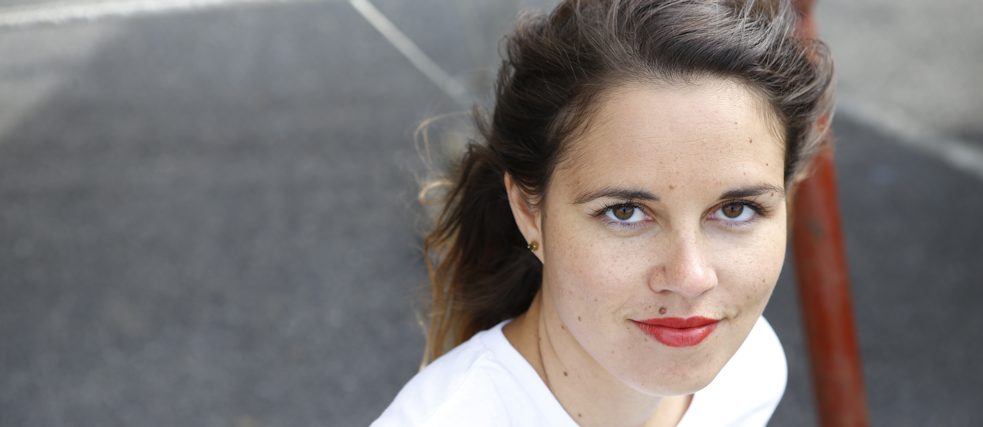Liberté, Egalité, Sororité
From a feminism of ideals to feminisms of everyday action

In 2015 Marie Beauchesne started up a feminist fashion label to contest entrenched standards of feminine beauty. In these very personal remarks, she explains why we need more sisterhood in our society.
We are currently experiencing an awakening of public awareness that I hope will prove historic above and beyond the current media coverage. #MeToo struck me as a new rallying cry, its echo forming a groundswell of female solidarity that fills me with hope. I needed that, for although I’m deeply convinced that change is possible, day-to-day life is ever fraught with frustrations and emotional setbacks.
This surge of female solidarity, or sisterhood, is a collective response – to physical assaults, of course, but also to sexist wrongs of all kinds: from the symbolic violence of sexist advertising to everyday sexual harassment, which is so frequent and widespread that it leaves us speechless. But we mustn’t remain silent anymore. And it is easier for women from all walks of life to speak out if we join forces, for there is strength – and sway – in numbers.
Sisterhood can also be the force that holds our movement together. For, just as “woman” is an abstraction encompassing infinite variations, there are countless different kinds of “feminism”, too. Where do we start? How far do we go? Which compromises do we accept – or reject? Where do our struggles converge or diverge? Whom do we include or exclude? What forms of action should we prioritize? All these questions move us forwards through reflection and complementarity, but they can divide us too.
Sisterhood is the bond that unites our feminisms
There is so much left to do, to achieve, even if some people, even some women, feel there are “more important” issues to address: unemployment, melting ice caps, world hunger. This ranking of issues on a global scale of importance is not absent from our movements either. On many occasions since launching my brand Ypsylone in 2015, I’ve heard people say feminist fashion is, at best, of marginal importance compared to more serious issues like rape, female genital mutilation, harassment. And at the individual level, even an ad campaign that trivializes violence against women or glorifies anorexic chic obviously can’t be compared to the traumatic experience of a sexual assault. But for society as a whole, both forms of misogyny fuel rape culture.It is quite telling that the models and actresses regarded as “the most beautiful women in the world” are the ones who say nothing or merely what they’re told to say. That the #MeToo and #TimesUp movements are now emerging from these glamorous scenes raises the question: Are these campaigns that only “beautiful”, rich and famous women can afford to launch, or are they also the revenge of women who epitomize a “be-beautiful-and-shut-up” culture?
Whatever the answer, I firmly believe that ranking our approaches to feminism is a dead end. Whereas sisterhood is a way out, a constructive and comprehensive approach that involves supporting and strengthening one another, welcoming all the positive energies and initiatives that seek to shake things up, whatever their angle, whatever their medium of expression or field of activity. We need all these feminisms: on the ground and in theoretical exposition, at school and in the workplace, in the media and in politics, addressing painful subjects and all the small differences that make all the difference.
Sisterhood as an everyday mode of action
Sisterhood not only binds us together, it’s also a simple mode of action adapted to everyday life. In a TEDx talk I gave a year and a half ago, I offered a personal definition of feminism based chiefly on liberty. It’s not that equality is beside the point: to my mind, it’s a starting point and an indispensable legal fundament, but not necessarily an objective to aspire to in every respect. I have no desire to be equal to men, for I fail to see why we should strive to conform to a male standard. Is it really still necessary to show how toxic these standards can be? Not only for women, by the way, but for men, too: while they might not suffer as much from the myth of machismo, they’re not immune to the toxicity of gender stereotypes either. Old myths die hard.Sisterhood is at once a compass and a concrete goal that guides us and grounds us in action and everyday life. It means setting up support groups, making a habit of sharing the good things that happen to us, supporting one another in our choices, not leaving a friend or a stranger to cope with a tough situation all by herself.
Even if our ideals and ideologies may divide us, I hope sisterhood will bring us closer together. Although my goal sometimes seems too far off to me, I hope sisterhood and its countless little everyday acts of kindness and solidarity will remind me what a long way we’ve already come, and that the rest of the way will be all the shorter, the going all the easier, if we go it together.
Comments
Comment